
7 Essential Emotional Support Animal Laws Oregon Residents Must Know
by Lena Park
Last updated: July 9, 2025
Verified and Approved by:
Angela Morris,
MSW, LCSW
Fact Checked

Overview
This article addresses the vital emotional support animal (ESA) laws that residents of Oregon need to be aware of, especially concerning their housing and travel rights. It compassionately highlights the protections provided under the Fair Housing Act and the Air Carrier Access Act, underscoring the significance of obtaining valid ESA letters from licensed mental health professionals. These letters are essential for effectively navigating housing restrictions and travel challenges that individuals may face.
Living with mental health challenges can be incredibly tough, often leaving individuals feeling isolated and overwhelmed. The presence of an ESA can provide much-needed comfort and companionship, helping to alleviate some of these emotional burdens. With the right support, individuals can experience a profound sense of relief and stability in their lives.
It is crucial to understand that these ESA letters serve as a supportive solution, validating the need for emotional support and ensuring that individuals can access the housing and travel accommodations they deserve. By fostering a deeper understanding of these laws, we can empower individuals to advocate for their rights and well-being.
If you’ve ever felt anxious about traveling or uncertain about your housing situation due to your mental health, know that you are not alone. Many individuals share these concerns, and the support of an ESA can make a significant difference. Remember, help is available, and you have the right to seek the emotional support you need.
Introduction
Understanding the legal landscape surrounding emotional support animals (ESAs) is essential for Oregon residents grappling with mental health challenges. As more individuals recognize the profound therapeutic benefits these companions offer, being informed about the relevant laws can empower them to secure their rights and access the support they need. Yet, the complexities of federal and state regulations can often lead to confusion and frustration.
What key laws should residents be aware of to ensure they can live harmoniously with their emotional support animals? This journey can feel overwhelming, but know that you are not alone in seeking clarity and support.
Wellness Wag: Streamlined ESA Letter Services for Oregon Residents
At Wellness Wag, we understand the emotional challenges that can accompany mental health issues. Many individuals face difficulties in finding pet-friendly accommodations, which can further exacerbate feelings of anxiety and stress. That’s where our compassionate service comes in, offering a user-friendly platform for Oregon residents seeking guidance on emotional support animal laws in Oregon.
The journey begins with a brief assessment to determine eligibility, allowing us to connect with you on a personal level. Following this, a consultation with licensed mental health professionals ensures that your unique needs are addressed with care and understanding. Once authorized, clients can expect to receive their official ESA letter within 24 hours. This prompt assistance is crucial for those encountering housing restrictions or travel difficulties due to their mental health challenges.
By providing this efficient service, we not only alleviate the stress of finding suitable accommodations but also empower you with legal protections under the Fair Housing Act, Air Carrier Access Act, and emotional support animal laws in Oregon. Imagine the relief of knowing you have the support of your beloved pet by your side, helping you navigate through tough times.
Upon placing an order, you will receive a confirmation email detailing your purchase, reinforcing the reliability of our service. We want you to feel secure in your decision. With our money-back guarantee, Wellness Wag underscores our commitment to your satisfaction and the legitimacy of our services. We have proudly assisted over 50,000 patients in navigating their mental health needs through the companionship of their pets, and we are here to support you too.
If you find yourself struggling, remember that help is available. Let us be part of your journey toward emotional well-being, as we believe that every individual deserves the comfort and companionship that an ESA can provide.
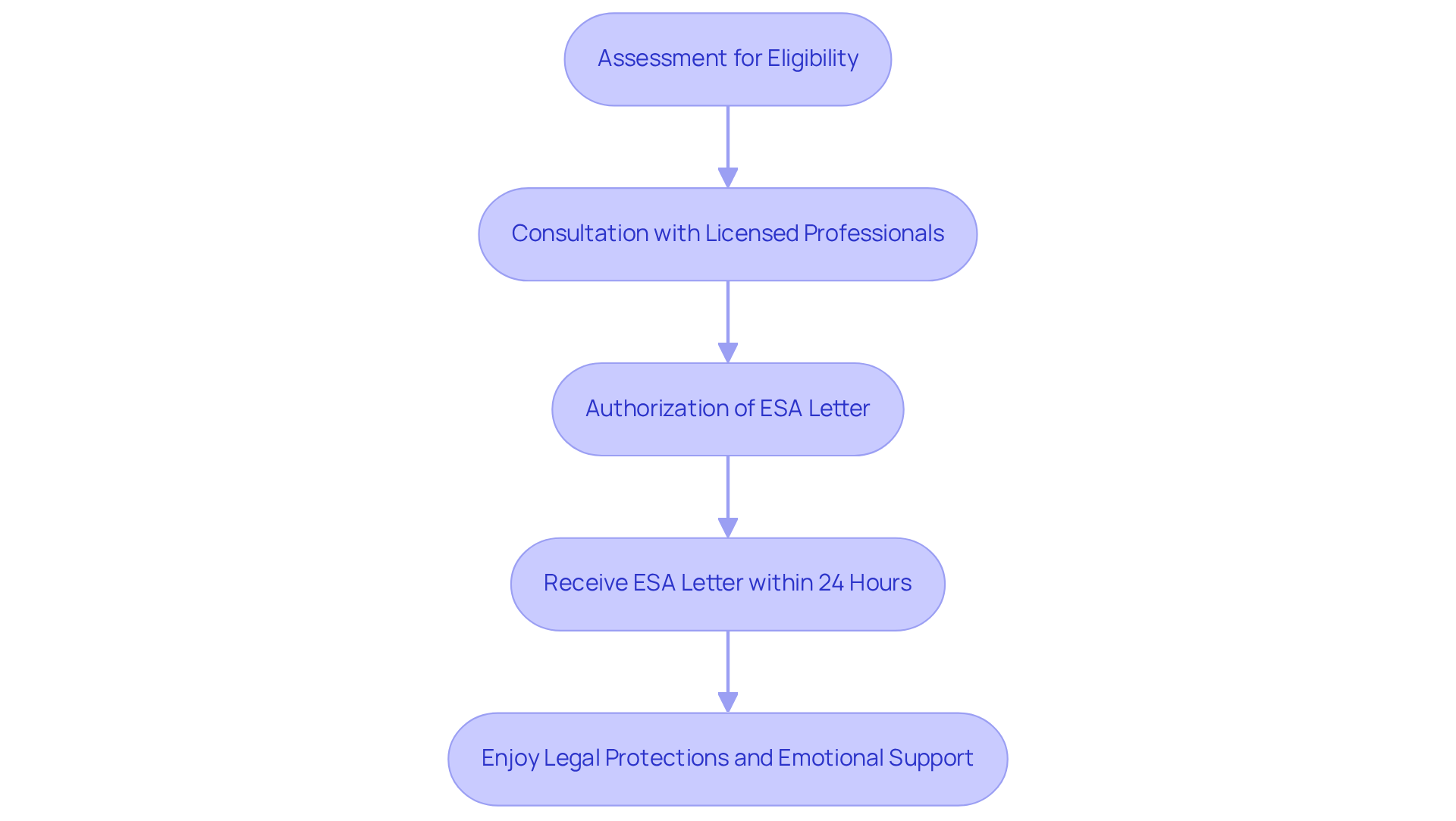
The Fair Housing Act: Protections for Emotional Support Animals in Housing
The Fair Housing Act (FHA) plays a crucial role in supporting individuals facing emotional challenges by requiring housing providers to make reasonable accommodations for tenants with valid ESA letters. Imagine the struggle of finding a home that welcomes you and your emotional support companion, especially when faced with no-pet policies. The good news is that landlords cannot deny an ESA if you provide the appropriate documentation. This means that you can live with your companion without the added stress of extra pet fees or deposits, ensuring that financial burdens do not weigh you down.
In Oregon, the interpretation of emotional support animal laws has resulted in a noticeable increase in complaints filed under the FHA related to ESAs. This highlights the importance of understanding your rights and the support available to you. Many have successfully navigated various housing situations, demonstrating the effectiveness of the FHA in fostering a nurturing environment for ESA owners.
It’s essential for landlords to recognize that valid ESA letters must originate from licensed mental health professionals. These letters should clearly articulate the necessity of the companion in managing the tenant’s mental health condition. By understanding this, landlords can help create a more compassionate living space.
Overall, the FHA offers vital safeguards for emotional assistance creatures, ensuring that individuals can reside with their companions in an environment that promotes healing and support. You deserve to live with your ESA, and the FHA stands as a testament to the importance of this companionship in your journey towards mental well-being.
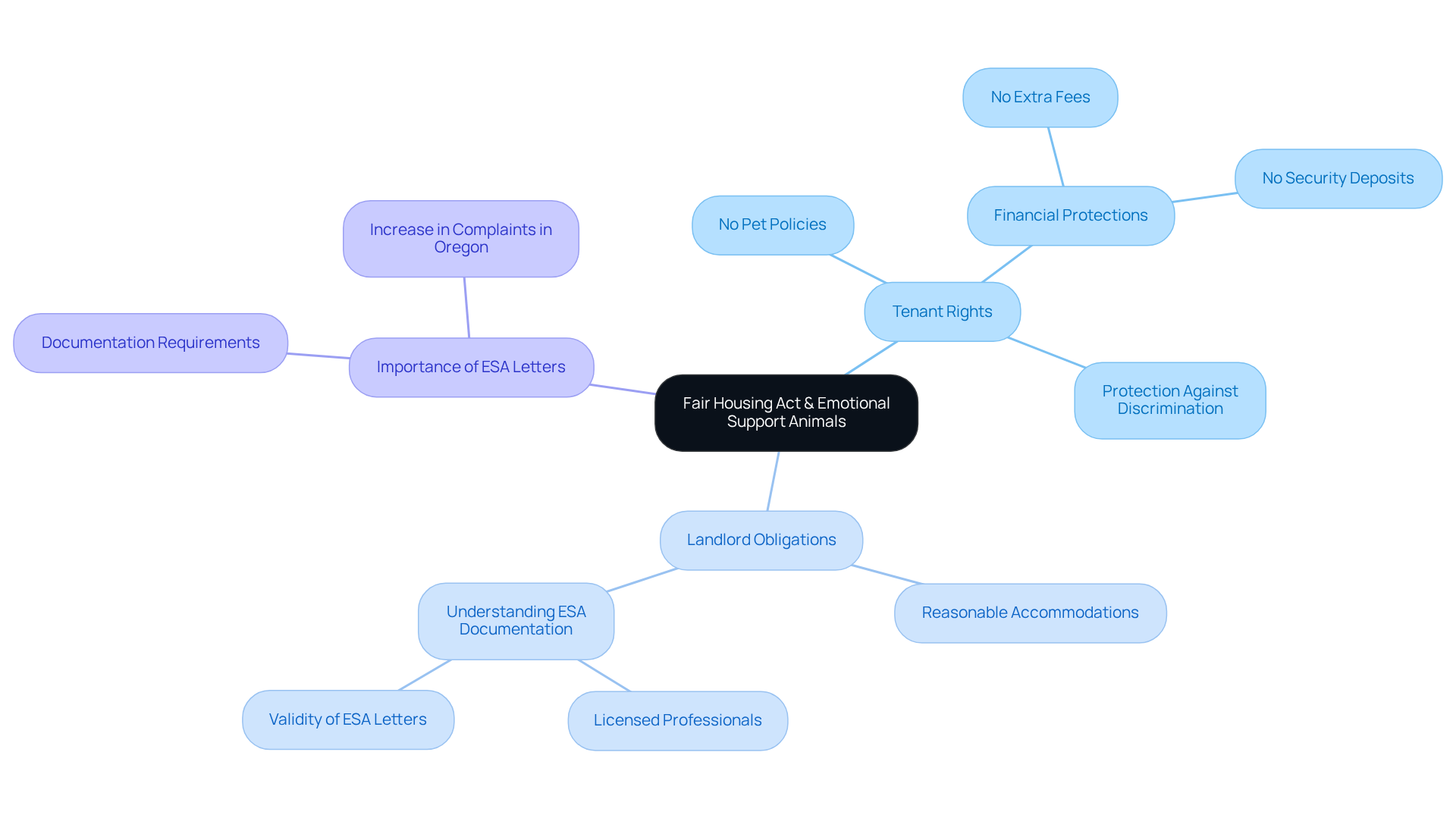
Air Carrier Access Act: Travel Rights for Emotional Support Animals
Traveling can be challenging, especially for individuals facing emotional struggles. Under the Air Carrier Access Act (ACAA), emotional support animal laws Oregon allow those with emotional support animals (ESAs) to travel with their beloved companions on commercial flights. This provision offers a sense of comfort and security during a time that can be stressful. However, it’s important to recognize that airline policies can differ significantly. Some airlines may have additional requirements or restrictions regarding the size and type of pet allowed in the cabin, which can add to the anxiety of travel.
Many ESA owners report a positive impact on their mental health—88% to be exact—highlighting the essential role these companions play in their lives. Despite the legal protections in place, there have been numerous incidents involving emotional support animals on flights. These occurrences have prompted airlines to reassess their policies, leading to an increase in complaints related to service animal accommodations. In fact, as of 2023, over 52% of fair housing complaints were linked to disability discrimination, illustrating the ongoing challenges faced by ESA owners.
It is crucial for travelers to familiarize themselves with their rights under the ACAA, including the emotional support animal laws Oregon, and the specific policies of the airlines they plan to use. Understanding these details can help alleviate some of the stress associated with travel. Remember, you are not alone in this journey; support is available, and your emotional well-being matters. If you have an ESA letter from a licensed mental health professional, it can serve as a valuable tool in navigating these policies and ensuring a smoother travel experience.
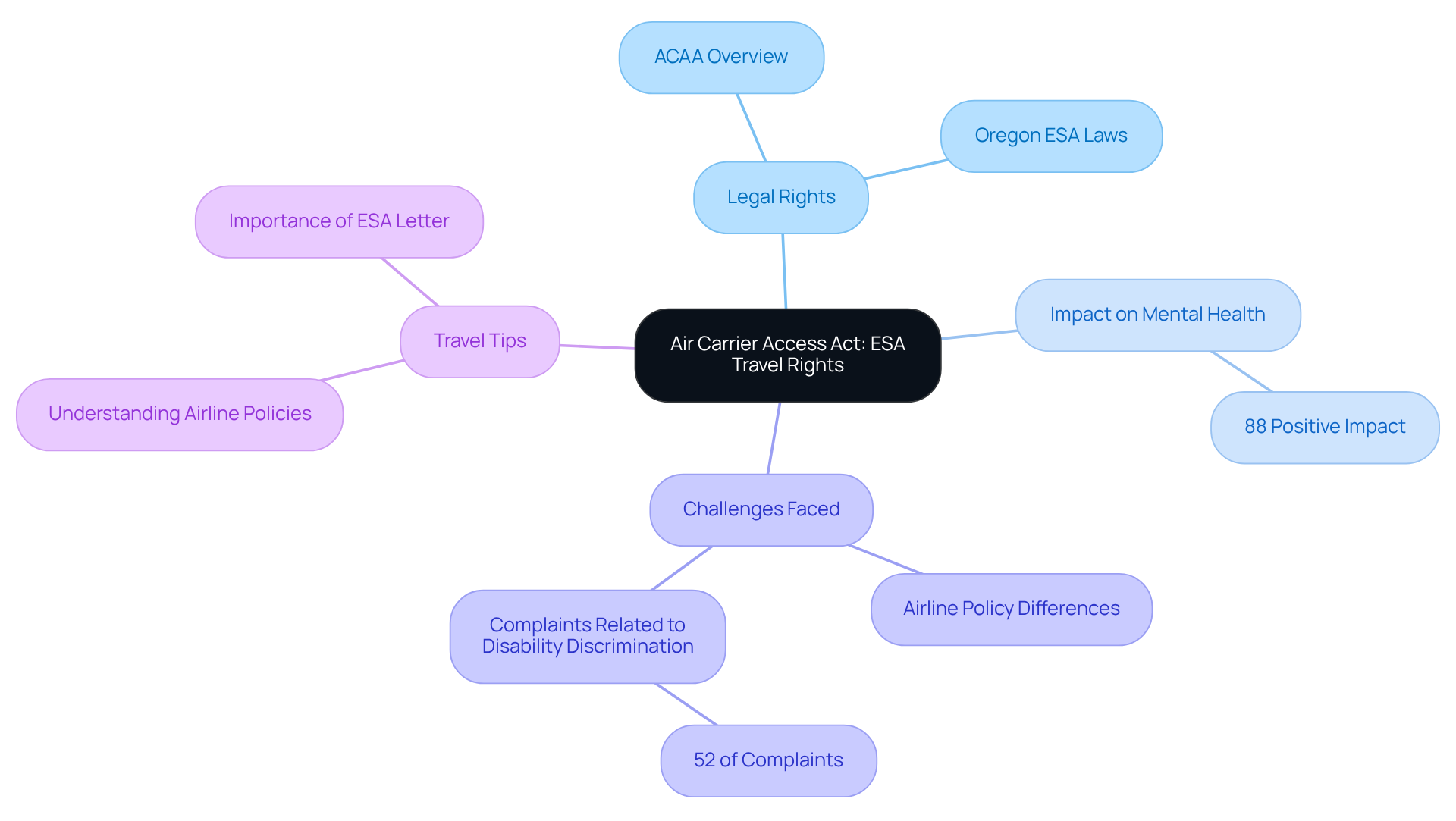
Oregon State Laws: Specific Regulations for Emotional Support Animals
Oregon does not have specific emotional support animal laws; instead, residents must adhere to federal regulations. The Fair Housing Act mandates that landlords and housing providers in Oregon comply with emotional support animal laws by accommodating individuals with emotional support animals, ensuring their rights are safeguarded.
While emotional support animals are recognized under federal law, it is important to understand that they do not have the same access rights as service animals in public spaces. Legal professionals emphasize that under the Fair Housing Act, housing facilities must allow service dogs and emotional support animals if they are essential for an individual with a disability to have an equal opportunity to use and enjoy their home.
This distinction is crucial for residents to grasp, as it influences their ability to secure housing in pet-restricted environments. Moreover, adherence to the Fair Housing Act is vital, with many housing providers in Oregon recognizing the importance of accommodating emotional support animal laws, thus fostering a nurturing environment for those who rely on these companions for emotional well-being.
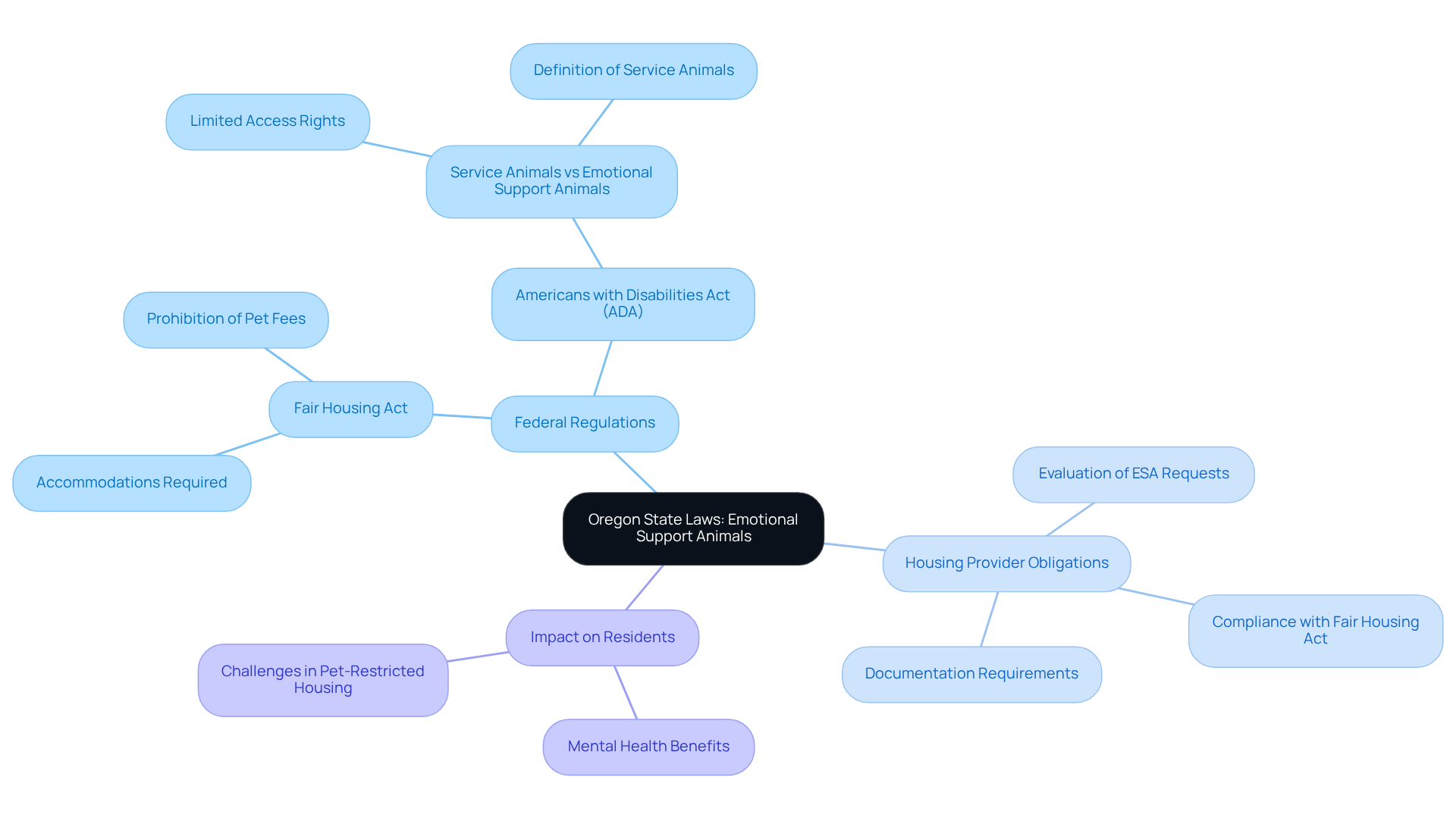
Service Animals vs. Emotional Support Animals: Key Legal Differences
The distinction between assistance creatures and emotional support creatures (ESAs) primarily hinges on their training and legal recognition. Assistance dogs, specifically trained to perform tasks for individuals with disabilities, possess extensive access rights under the Americans with Disabilities Act (ADA). This encompasses entry into public spaces such as restaurants, stores, and public transportation. It is vital to honor the working status of service dogs, refraining from distracting or petting them without permission from their handlers, as this can disrupt their tasks and jeopardize the safety and well-being of the handler. Conversely, emotional support creatures offer companionship and comfort but do not enjoy the same public access rights. They are classified as companions in public settings, indicating that they lack the legal protections afforded to service creatures.
Statistics indicate that awareness of these differences is critical; approximately 77.88% of students with service dogs are knowledgeable about their rights regarding removal requests in educational environments. Yet, many individuals remain unaware of the specific legal status of emotional support animal laws in Oregon, which can lead to challenges in accessing housing and public spaces. Disability rights advocates stress the importance of understanding these distinctions to effectively champion access rights under emotional support animal laws in Oregon.
As of 2025, the ADA continues to uphold the rights of service creatures, while emotional support animal laws in Oregon primarily protect emotional support pets under housing regulations, such as the Fair Housing Act. This legal framework requires reasonable accommodations for individuals with disabilities, permitting ESAs to live in pet-restricted housing. However, emotional assistance pet owners often face legal hurdles, such as rejection of rental agreements or additional fees imposed by landlords, complicating their living situations.
In summary, grasping the distinctions in legal status and access rights between service creatures and emotional assistance beings is essential for individuals seeking to navigate their rights and responsibilities effectively. Being informed about proper etiquette when interacting with service dogs and understanding the legal landscape can empower individuals to advocate for their needs and foster respectful interactions.
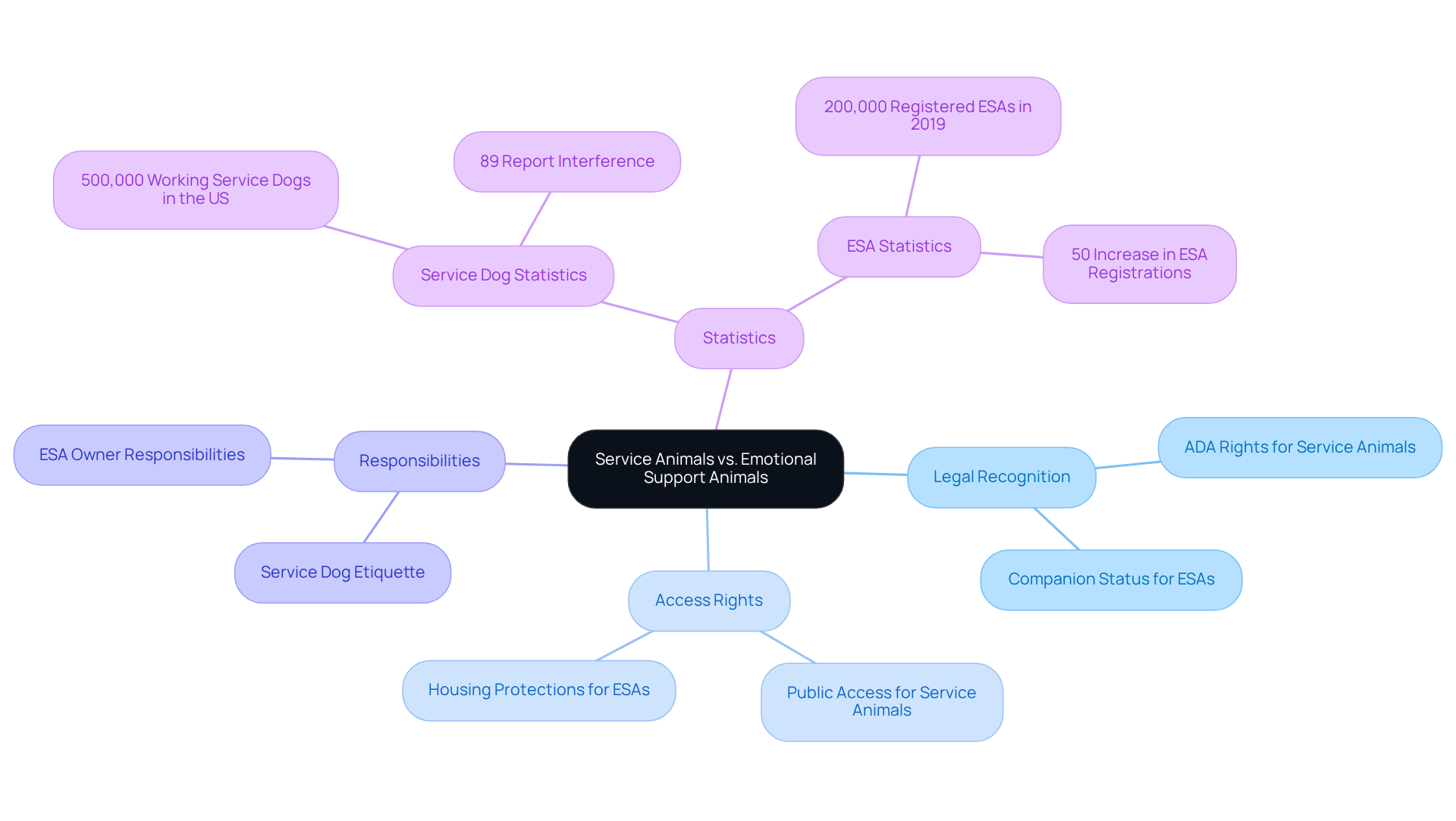
Licensed Mental Health Professionals: Essential for ESA Evaluations
Navigating the path to mental wellness can be challenging, especially when you’re seeking support. Many individuals face emotional hurdles that can feel overwhelming. In times like these, an emotional support animal (ESA) can provide the comfort and companionship needed to help ease those burdens.
To acquire a valid ESA letter in accordance with emotional support animal laws Oregon, it’s essential to consult with licensed mental health professionals who can thoughtfully assess your unique needs and determine the necessity of an emotional assistance creature. This evaluation process is not just a formality; it ensures that your ESA letter is both legitimate and compliant with emotional support animal laws Oregon.
At Wellness Wag, we understand the importance of this process, and we are here to help. We connect clients with qualified professionals who genuinely appreciate the therapeutic benefits of animal companionship. Our comprehensive Tele-Therapy services allow you to engage in evaluations from the comfort of your home, making the experience seamless and stress-free.
Our licensed mental health professionals are dedicated to providing compassionate care and guidance, walking you through each step to secure your ESA letter efficiently. We know how vital it is to feel understood and supported during this journey. With Wellness Wag, you can trust that you are receiving authentic assistance tailored to your emotional needs. Remember, you are not alone; we are here to support you every step of the way.
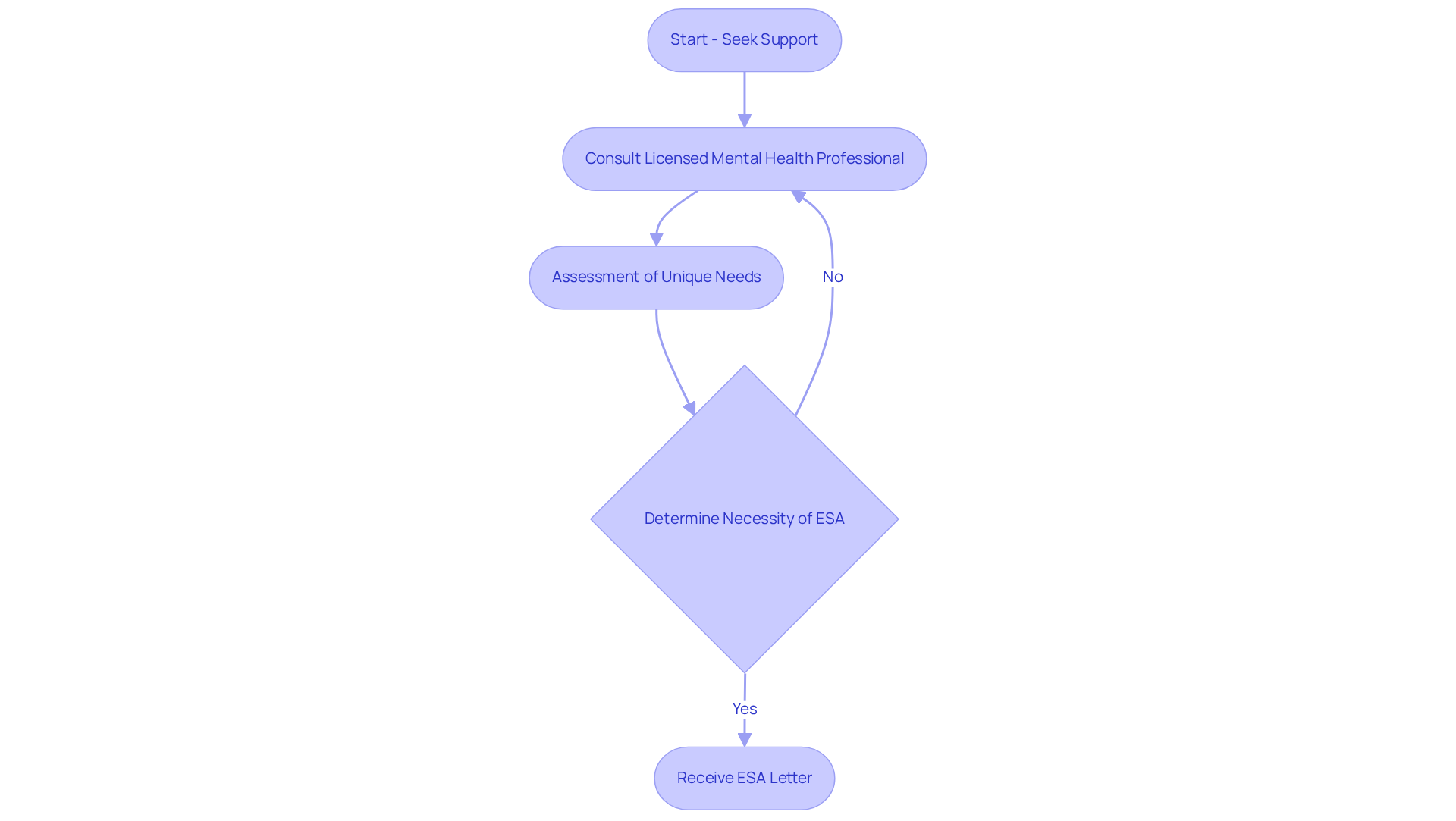
Housing Rights: Advocating for Your Emotional Support Animal
Under the Fair Housing Act (FHA), individuals with emotional support animals (ESAs) can advocate for their housing needs in accordance with emotional support animal laws Oregon. It can be incredibly disheartening when a landlord denies an ESA request or tries to impose additional fees. In such situations, tenants can present their valid ESA letter, which serves as essential documentation of their rights.
It’s important for tenants to educate landlords about the FHA and the emotional support animal laws Oregon, which prohibit discrimination against individuals with ESAs and mandate reasonable accommodations. Keeping a record of all communications with landlords can create a clear trail of interactions, which may prove invaluable if disputes arise. If challenges persist, seeking legal advice can be a wise and supportive step. Empowering oneself with knowledge of emotional support animal laws Oregon is vital for ensuring the ability to live harmoniously with emotional support animals.
Understanding the distinction between emotional support animals and service dogs is equally important. While service dogs are not legally required to be certified or registered, obtaining certification can enhance credibility and demonstrate that the dog has undergone proper training. This distinction is crucial for tenants to grasp, as it can significantly influence their advocacy efforts regarding housing accommodations. By effectively advocating for their rights, tenants can navigate housing challenges and secure the companionship of their beloved ESAs, fostering a sense of support and well-being in their lives.
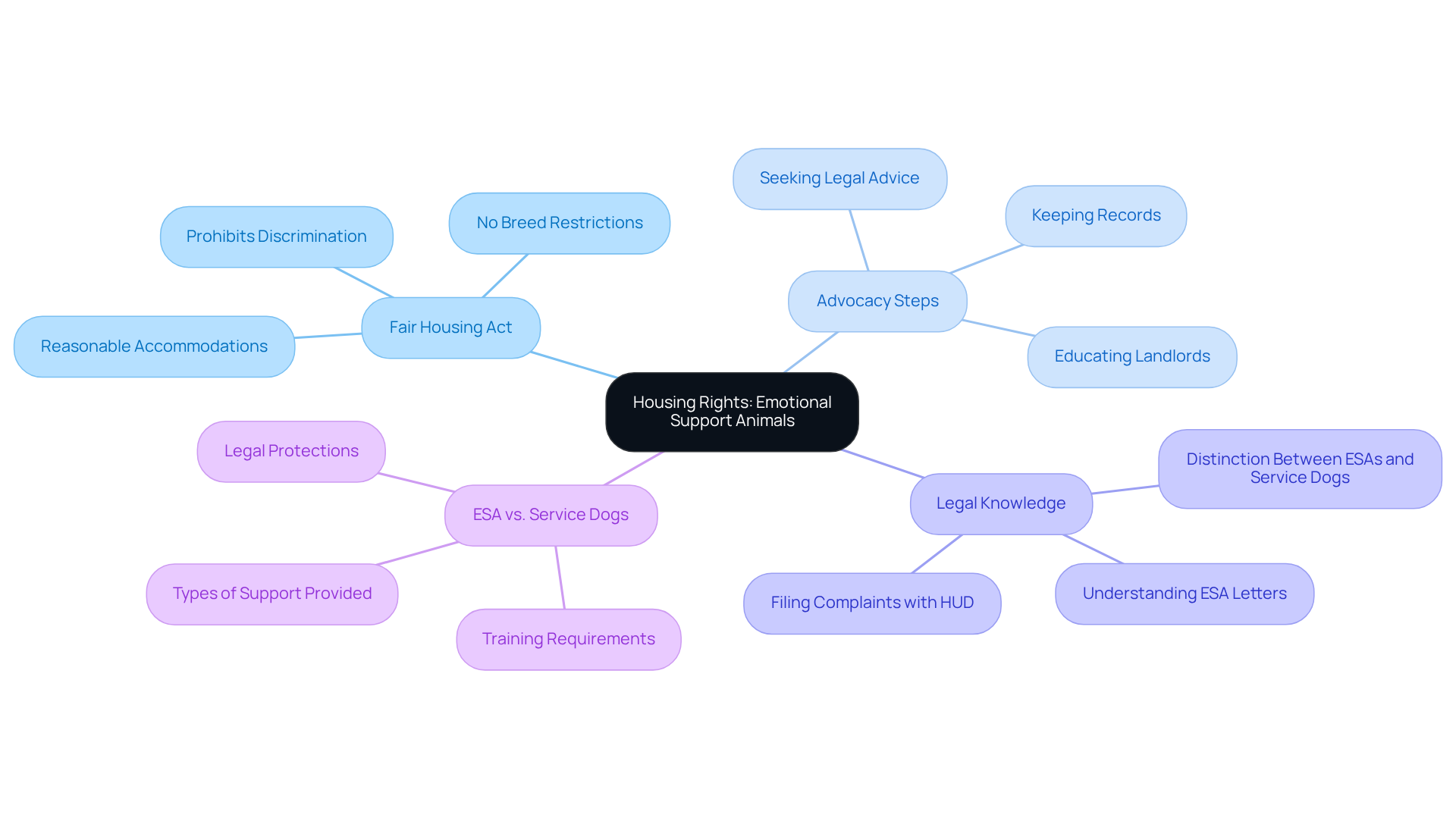
Legal Requirements: Obtaining a Valid Emotional Support Animal Letter
Navigating the process of obtaining a legitimate emotional support animal (ESA) letter can feel overwhelming, especially for those grappling with mental health challenges. Many individuals experience emotional struggles that can leave them feeling isolated and in need of support. To address these feelings, the first step is to complete an assessment that determines eligibility for an ESA. This is not just a formality; it’s a crucial step in recognizing and validating your needs.
Following the assessment, a consultation with a licensed mental health professional is essential. This meeting is an opportunity to discuss your specific needs and how an ESA can provide the emotional support you deserve. Once approved, you can expect to receive your ESA letter, typically within 24 hours. This letter is not merely a document; it is a lifeline that acknowledges your journey and the importance of having an ESA by your side.
For the letter to meet legal standards, it must include vital information such as the mental health professional’s license number, their contact details, and a clear statement outlining your need for the ESA. It’s important to ensure all these requirements are met to prevent potential rejection. Unfortunately, statistics show that rejection rates for ESA letters under emotional support animal laws Oregon can be significant, which can add to the stress of an already challenging situation.
Mental health specialists emphasize the importance of comprehensive assessments, as they not only ensure adherence to legal standards but also provide genuine aid for those truly in need of emotional support. Remember, you are not alone in this journey. There is support available, and taking these steps can lead to the comfort and companionship that an ESA can offer. Reflect on how having an ESA could change your life, and know that help is within reach.
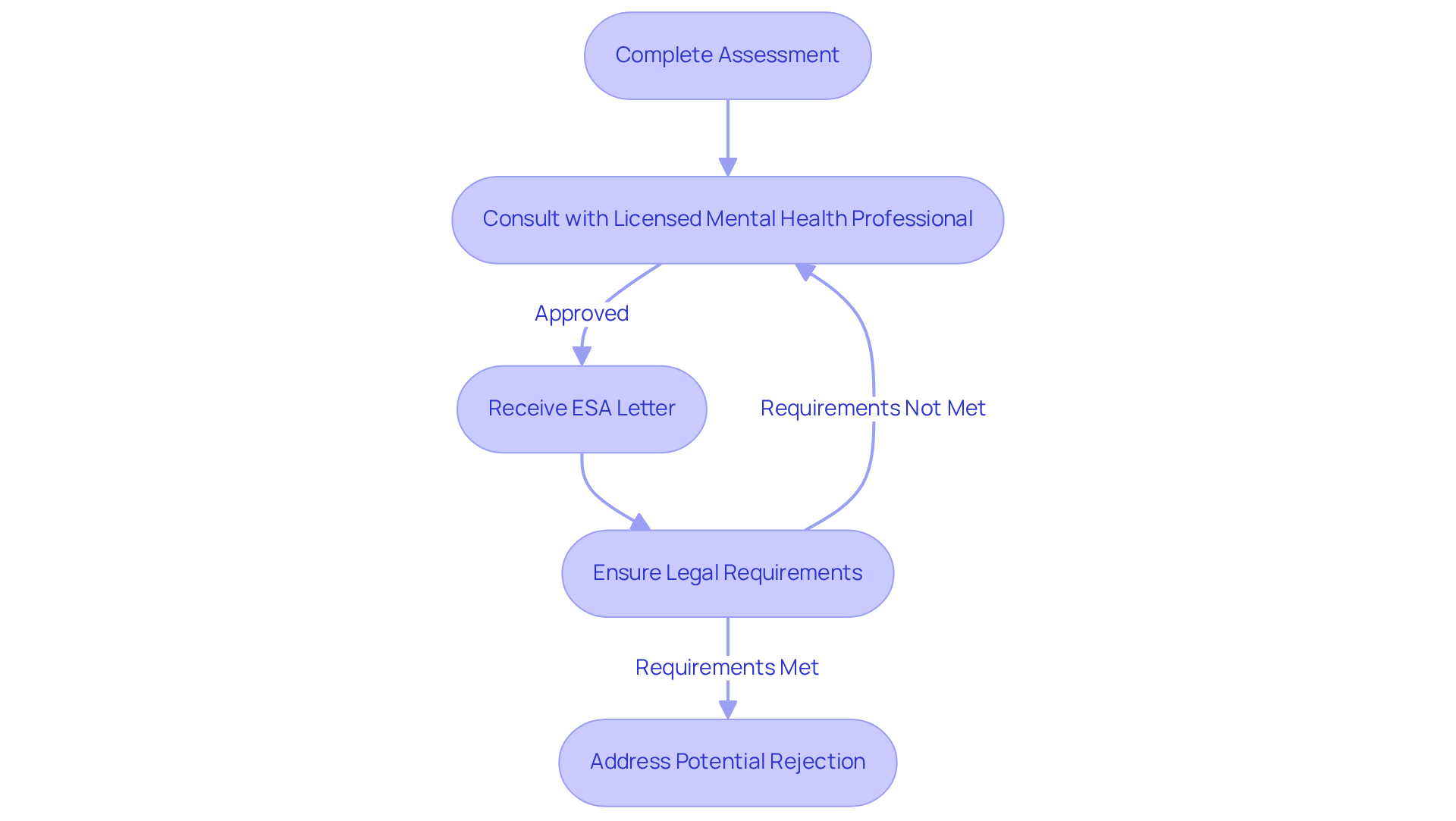
Limitations and Exceptions: Navigating ESA Laws in Oregon
Understanding the challenges faced by individuals with mental health issues is crucial, especially when navigating the complexities surrounding emotional support animal laws in Oregon. While these creatures offer significant emotional benefits and are protected under the Fair Housing Act (FHA), there are important limitations and exceptions that residents need to be aware of. For instance, landlords may deny an ESA request if the animal poses a direct threat to the health or safety of others, or if the tenant cannot provide a valid ESA letter from a licensed mental health professional. This highlights the necessity of obtaining legitimate documentation, as fraudulent letters can lead to unfortunate rejections.
It’s essential to recognize that, unlike assistance animals, which enjoy extensive access rights in public spaces, emotional support animals do not share the same privileges. This distinction often creates confusion for both tenants and landlords. For example, while a service dog can accompany its owner in restaurants and stores, an ESA may be restricted from these environments unless specific accommodations are arranged.
In Oregon, there are certain exceptions to emotional support animal laws that individuals should understand. The FHA does not extend its protections to owner-occupied buildings with four or fewer units, allowing landlords in these cases to deny ESA requests without breaching federal law. Additionally, landlords may impose restrictions based on the size or type of pet, particularly if it is deemed unsuitable for the property or poses a safety concern.
Experts emphasize the importance of clear communication and proper documentation when navigating these laws. J. Courtney Cunningham, an attorney specializing in housing law, notes that landlords must provide valid reasons for any ESA denial, ensuring that their decisions are well-documented and justified. Understanding these limitations is vital for individuals advocating for their rights while fostering a cooperative relationship with their landlords. Remember, you are not alone in this journey; support is available to help you navigate these challenges.
Mental Health Impact: The Role of Emotional Support Animals in Treatment
Emotional support creatures play a vital role in addressing mental health issues such as anxiety, depression, and PTSD. The companionship and unconditional love that emotional support animals provide can significantly alleviate feelings of loneliness and distress, fostering emotional well-being. Research has shown that having a pet can lower stress levels, enhance mood, and improve overall quality of life.
In a pilot study, participants reported meaningful reductions in anxiety and depression after spending time with their emotional support animals over the course of a year. Janet Hoy-Gerlach, PhD, emphasizes the benefits of having an emotional assistance animal, underscoring the importance of recognizing the mental health impacts of these beloved companions.
Furthermore, during the pandemic:
- 62% of individuals with emotional support animals noted improvements in their mental well-being
- 41% of those without such support experienced a decline in their mental health
This highlights the invaluable role of emotional support animals, as outlined in emotional support animal laws Oregon, for those seeking therapeutic support. However, it’s crucial to acknowledge that 70% of pet owners either lack knowledge about how to get their pet certified as an ESA or believe they do not qualify, which presents a significant barrier to accessing these essential benefits.

Conclusion
Understanding the emotional support animal (ESA) laws in Oregon is essential for residents facing mental health challenges. These laws are designed to ensure that individuals can live with their emotional companions, providing vital support and comfort during difficult times. By familiarizing oneself with these regulations, including the Fair Housing Act and the Air Carrier Access Act, individuals can better advocate for their rights and navigate the complexities surrounding housing and travel with their ESAs.
Many individuals struggle with emotional challenges that can feel overwhelming. The presence of an ESA can offer a sense of relief and companionship, helping to ease these burdens. However, it’s important to obtain a legitimate ESA letter from licensed mental health professionals, as this documentation is crucial for accessing the protections afforded under federal law. It is essential to understand the distinctions between service animals and emotional support animals; while emotional support animals provide significant emotional benefits, they do not possess the same public access rights as service animals. This distinction can lead to confusion in various situations, making it vital to be informed.
In light of these insights, empowering oneself with knowledge about emotional support animal laws is crucial for Oregon residents. This understanding not only aids in securing appropriate housing but also enhances overall mental well-being by ensuring that individuals can maintain their supportive relationships with their pets. For those seeking assistance, resources like Wellness Wag provide valuable services to help navigate the process of obtaining ESA letters and connecting with mental health professionals.
Remember, the journey toward emotional wellness is supported by the companionship of your ESA. Knowing your rights can make all the difference, allowing you to embrace the comfort and support your emotional companion brings into your life. Reflect on how your ESA enriches your daily experiences and consider the importance of having the right information at your fingertips.
Frequently Asked Questions
What services does Wellness Wag provide for Oregon residents?
Wellness Wag offers a user-friendly platform for Oregon residents seeking guidance on emotional support animal (ESA) laws, including a brief assessment to determine eligibility, consultations with licensed mental health professionals, and the issuance of official ESA letters within 24 hours.
How does Wellness Wag help with housing issues related to emotional support animals?
Wellness Wag assists clients in obtaining valid ESA letters that provide legal protections under the Fair Housing Act, allowing individuals to live with their emotional support animals without facing additional pet fees or deposits from landlords.
What is the Fair Housing Act (FHA) and how does it protect ESA owners?
The Fair Housing Act requires housing providers to make reasonable accommodations for tenants with valid ESA letters, ensuring that landlords cannot deny housing based on no-pet policies and that individuals can live with their emotional support companions.
What are the requirements for an ESA letter to be considered valid under the FHA?
A valid ESA letter must originate from a licensed mental health professional and clearly state the necessity of the emotional support animal in managing the tenant’s mental health condition.
What rights do individuals have under the Air Carrier Access Act (ACAA) regarding travel with emotional support animals?
The ACAA allows individuals with emotional support animals to travel with their companions on commercial flights, providing comfort and security during travel, although airline policies may vary.
How important is it for ESA owners to understand airline policies when traveling?
It is crucial for ESA owners to familiarize themselves with their rights under the ACAA and the specific policies of the airlines they plan to use, as this knowledge can help alleviate stress and ensure a smoother travel experience.
What is the impact of emotional support animals on mental health?
Many ESA owners report a positive impact on their mental health, with studies indicating that 88% of individuals find their emotional support animals essential to their well-being.
How does Wellness Wag ensure customer satisfaction?
Wellness Wag provides a confirmation email upon placing an order and offers a money-back guarantee, emphasizing their commitment to customer satisfaction and the legitimacy of their services.
Certify Your Emotional Support Animal Today

Why You Can Rely on Us?
At Wellness Wag, we believe your pet deserves care rooted in both science and compassion. Each article is carefully researched, written in clear language for pet owners, and then reviewed by qualified professionals to ensure the information is evidence-based, current, and practical for real-life care. Our goal is to help you feel confident in making informed decisions about your pet’s health and well-being.
Reviewed by
Angela Morris, MSW, LCSW
Angela is a licensed clinical social worker with 20 years of experience in patient advocacy and community mental health. She has assisted numerous clients with ESA evaluations and brings a deep understanding of disability accommodations, ensuring that all information is accurate, supportive, and practical.

Written by :
Lena Park
Last Updated :
July 9, 2025












